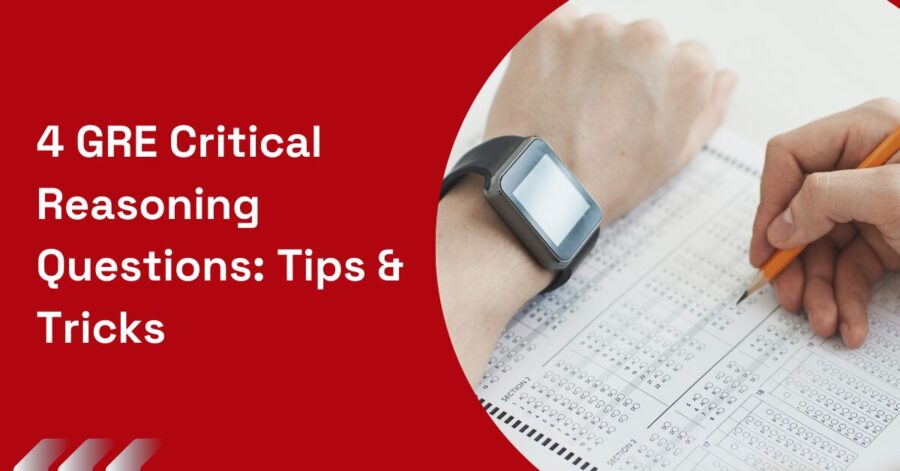17 December 2024
7 minutes read
4 GRE Critical Reasoning Questions: Tips & Tricks

Key Takeaways
- 40% of students find GRE Critical Reasoning questions challenging, but focusing on logical analysis, not memorization, helps simplify these tricky questions.
- Mastering the different types of GRE critical reasoning questions, from identifying assumptions to weakening arguments, requires smart strategies and consistent practice.
- Efficient time management and reading the question stem first are essential for staying focused and improving your accuracy on test day, leading to a higher GRE verbal score.
Did you know that 40% of students struggle the most with GRE Critical Reasoning questions during the verbal section of the GRE? The ability to break down complex arguments, identify assumptions, and arrive at the correct answer isn’t something that comes naturally to many test-takers. CR questions test not just what you know but how well you can think under pressure, leaving many feeling overwhelmed during their GRE test prep.
The real challenge? These questions often feel vague and tricky, making it hard to spot the right answer, let alone confidently understand why it’s correct. Many students spend valuable time getting lost in the weeds of confusing question stems or find themselves second-guessing their choices. But the solution isn’t about studying harder; it’s about studying smarter. With the right strategies, you can master the different types of critical reasoning questions on the GRE, improve your GRE score, and boost your confidence on test day.
What Are GRE Critical Reasoning Questions On The GRE Exam?
When preparing for the GRE to get the average score, one section that can make even the most prepared test-taker feel uneasy is Critical Reasoning in the verbal section. These questions aren’t just about what you know but how well you can analyze and think critically. They’re designed to challenge your ability to evaluate arguments, assumptions, and logical conclusions. But don’t worry—once you understand what these questions are asking and how to approach them, they become a lot less intimidating.

So, what exactly are GRE Critical Reasoning questions? Here are five key things you need to know:
- Argument-Based Questions: These questions revolve around short passages, typically arguments, where you’ll need to identify assumptions, flaws, or logical gaps. Your job is to assess the reasoning behind the argument.
- Different Question Types: You’ll encounter a variety of critical reasoning question types, including those that ask you to strengthen or weaken the argument, identify the conclusion, or pinpoint an assumption. Each type requires a slightly different GRE study strategy.
- Focus on Logic, Not Knowledge: These questions aren’t testing your factual knowledge or vocabulary—they’re assessing your ability to think critically and logically. That means even if the topic is unfamiliar, you can still answer the question correctly by following the reasoning.
- Challenging, But Predictable: While the questions can be tricky, they often follow a predictable format. Once you learn to recognize common question stems and reasoning patterns, you’ll find yourself getting better at cracking them.
- Time Management is Key: Critical reasoning questions can be time-consuming if you overthink them. One of the biggest challenges is finding the right balance between careful reading and efficient answering—something that improves with practice during your GRE prep.
6 Tips To Ace GRE Critical Reasoning Question Types
Critical Reasoning on the GRE can feel like a mental trap. You read the question, think you’ve understood it, and then—boom—you’re stuck between two answer choices that seem equally correct (or equally wrong!). The frustration is real, and it’s not uncommon to second-guess yourself or feel overwhelmed by critical reasoning GRE questions.
But don’t worry—you’re not alone. The real challenge here is not just in reading the argument but in navigating the tricky type of GRE questions that demand logical reasoning, leaving you questioning whether you’ve answered the correct question.
Now, let’s get straight to how many critical reasoning questions you can expect and, more importantly, how to ace GRE effectively with these six practical tips:
1. Read the Question Stem First
Before diving into the argument, read the question stem first. This will help you understand what the question is asking, so you know exactly what to look for in the argument. It saves you time and ensures you’re answering the correct question as you go. Create a 10 days GRE study plan that focuses specifically on critical reasoning questions.
2. Identify the Argument Structure
For critical reasoning-type questions, break the argument down into its components—premise, conclusion, and any assumptions. This helps you stay focused on the core of the argument and prepares you to handle questions that challenge your thinking.
3. Anticipate the Answer
Before looking at the answer choices, try to anticipate what the correct answer might be. This strategy helps reduce confusion when you encounter answer choices designed to test your skill in logical reasoning.
4. Beware of Traps
Many verbal reasoning questions have incorrect choices that are cleverly designed to distract you. Look for choices that are irrelevant to the argument, or that might correctly answer the question in a different context but not this one. Always keep the question stem in mind after you’ve read it.
5. Practice with Purpose
The more you practice critical reasoning GRE questions, the better you’ll get. Focus on sample GRE critical reasoning questions and review your mistakes carefully. This will help you recognize patterns in the questions asked and build the confidence you need for test day.
6. Manage Your Time
On test day, time management is crucial. Don’t get stuck on one or two critical reasoning questions. Move on if you’re stuck and come back later—sometimes a fresh perspective can make all the difference in your critical reasoning. Create a 2 month study plan for GRE.
4 GRE Critical Reasoning Practice Questions
The best way to master GRE Critical Reasoning is to actually get into the questions themselves. Whether you’re looking to strengthen an argument, weaken it, or simply find the assumptions, GRE CR questions are designed to test your skill in critical thinking and logical analysis.
Below are four practice questions that simulate the critical reasoning-style questions asked on the GRE. Use them to test your skills and see how well you’re prepared to handle these tricky scenarios on the real test day.

1. Argument Flaw Question
Question: A company executive argues that, since online sales increased by 20% last year, traditional retail stores are becoming obsolete and should no longer be part of the company’s business strategy.
Which of the following points out a flaw in the executive’s reasoning?
A. Online sales make up less than 10% of the company’s overall sales.
B. Many consumers still prefer to shop in traditional retail stores for certain products.
C. A significant portion of the company’s revenue comes from in-store purchases.
D. Online sales typically increase during holiday seasons.
E. The cost of running traditional retail stores has not decreased.
2. Weaken the Argument
Question: A study suggests that people who drink coffee every morning are more likely to be productive at work than those who do not. The study concludes that coffee consumption causes increased productivity.
Which of the following, if true, would weaken the conclusion drawn by the study?
A. Many people who drink coffee also get more sleep than those who don’t.
B. The study did not account for the amount of coffee consumed daily.
C. People who drink coffee are often in high-stress jobs that require focus.
D. Productivity is more often influenced by the amount of sleep than coffee consumption.
E. Some people who do not drink coffee are still highly productive at work.
3. Assumption Question
Question: A politician argues that increasing funding for education will lead to higher graduation rates, which will ultimately boost the economy.
Which of the following is an assumption required by the argument?
A. The quality of education depends on the amount of funding received.
B. Higher graduation rates always result in economic growth.
C. More funding for education leads to better educational resources.
D. The current level of education funding is insufficient.
E. Economic growth is linked to education quality.
4. Strengthen the Argument
Question: A city planner proposes building more bike lanes throughout the city to reduce traffic congestion. The planner argues that as more people switch to biking, fewer cars will be on the road, and traffic will ease.
Which of the following would strengthen the planner’s argument?
A. Studies show that cities with more bike lanes have lower levels of traffic congestion.
B. Biking is a popular activity in the city, especially during weekends.
C. The cost of installing bike lanes is lower than the cost of expanding roads for cars.
D. Other cities have implemented similar programs with positive results.
E. The city has seen an increase in bike sales in recent years.
Conclusion
When it comes to GRE Critical Reasoning, there’s no magic formula—just smart preparation and practice. The key is understanding the logic behind the questions and recognizing patterns in the types of GRE reading comprehension questions you’ll face. Sure, the critical reasoning section can feel tricky, but by mastering the structure of arguments and honing your reasoning skills, you can tackle them confidently.
Remember, it’s not about cramming information; it’s about training your brain to think critically and spot the subtleties in arguments. Take your time, trust your preparation, and you’ll walk into test day ready to ace this part of the GRE verbal section.
Take charge of your destiny with Ambitio’s Shortlist Builder, allowing you to tailor your choices meticulously. This tool empowers you to filter and refine your options based on your preferences and criteria, ensuring that your final shortlist is perfectly aligned with your aspirations.
FAQs
How do I register for the GRE?
How much does the GRE cost?
Can I change the date or location of my test?
Can I retake the GRE? How many times can I take the test?
What materials are tested on the GRE?
The GRE assesses three main areas: Analytical Writing, Verbal Reasoning, and Quantitative Reasoning. Each section evaluates different skills, such as critical thinking, vocabulary, and math problem-solving abilities
What is the format and length of the GRE?
The GRE is a computer-based test that lasts approximately 2 hours. It includes sections for Analytical Writing, Verbal Reasoning, and Quantitative Reasoning, with a total of 1 essay task and several multiple-choice questions

You can study at top universities worldwide!
Get expert tips and tricks to get into top universities with a free expert session.
Book Your Free 30-Minute Session Now! Book a call now




























